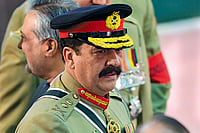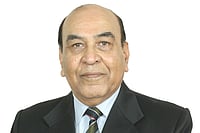Even as I write, the encounter at Nagrota’s artillery unit is on; our casualties have been heavy though the terrorists got eliminated. In Rawalpindi, there are ceremonies bidding farewell to General Raheel Sharif, the outgoing Pakistan army chief who always bore a grudge against India for the death of his elder brother and other losses in his family in the 1971 Indo-Pak war. The new chief, General Qamar Javed Bajwa, was the third among the eligible generals. Symbolically, the Nagrota encounter conveys the message: nothing is going to change. Gen Sharif’s aggressive stance on the LoC is a slow but sure admission of the success of the Indian surgical strikes in September in response to the Uri terror attack. He could not have admitted it publicly due to sheer military ego. Gen Bajwa isn’t going to change anything in a hurry either.
Each time a new army chief takes over in Pakistan, there is deep apprehension in the Indian media about his possible stance. Analyses are usually based on his known characteristics and background. Gen Sharif’s closeness to General Pervez Musharraf and the sacrifice of his family were harped upon extensively when he was appointed. In the case of Gen Bajwa, his experience during his three key appointments in the PoK region is being taken to signal either greater pro-activeness or a potential realisation that, given the current temperatures at the LoC, the ceasefire of November 2003 is likely to be permanently abrogated. Bajwa’s appointments in 10 Corps (PoK corps) included the all-important chief of staff at Corps HQ, general officer commanding of Force Command Northern Areas, which is opposite our Ladakh sector and Siachen glacier, and, finally, as corps commander headquartered at Rawalpindi. The last one is important in terms of political liaison, strategic understanding and recognition in the national capital; the other two would have given him hands-on experience in dealing with the LoC and the tactics of proxy war.
Bajwa is also being seen as Nawaz Sharif’s man, chosen over the others because of the positive stance taken by him and his Corps Headquarters during Imran Khan’s 2014 Islamabad sit-in. Many say the PM did not appreciate his senior Lt Gen Ishfaq Nadeem Ahmad’s aggressive personality. There could not be a greater misreading than this as it must have been Gen Bajwa’s professional record and his recommendation by Gen Raheel Sharif that secured him the coveted appointment. An alumnus of Staff College, Camberley, in the UK and the Naval Postgraduate School, Monterey, in the US, Gen Bajwa was nominated as the commander of the Pakistan UN Brigade in Congo and served under an Indian general (Major General Bikram Singh, who went on to head the army). Clearly, he was done no favour by the PM and, if he is beholden to anyone, it is the Pakistan army. He is unlikely to toe any civilian line looking at greater rapprochement with India.
It will be worth recalling that the Pakistan deep state, which includes the army leadership, abides by the “strategy of a thousand cuts”, followed by all army chiefs since Zia-ul-Haq conceptualised it in 1977. They have always scuttled every attempt at pursuing peace with India, and Gen Sharif did the same after PM Modi’s visit to Lahore last December. Gen Bajwa will be his own man, meaning Pakistan’s main national interest as perceived by the GHQ will be followed to the tee, at least in the first half of his tenure. It took Gen Musharraf four years and umpteen attempts at executing the thousand-cuts strategy before beginning to realise its futility in 2003. That’s when he initiated informal ceasefire and backroom diplomacy to search for amicable solutions. In comparison, Gen Bajwa has neither the experience nor the gravitas to change the course of Indo-Pak relations. If he does try any experiments, that would be much later in his tenure.
Conjecture that the supersession of General Zubair Mahmood Hayat by Gen Bajwa will cause dissension among his loyalists in the army is misplaced. Gen Hayat, an artillery officer who looked after the Strategic Forces Command (nuclear assets) and became chief of the general staff, has also been promoted to four-star rank and appointed chairman of the Joint Chiefs of Staff Committee. There is no history of such dissension in the Pakistan Army where the arrangement of having two four-star officers has existed fairly long.
Unless Pakistan feels the heat of India’s comprehensive efforts to nail it as the core centre of radicalism and terror in the eyes of the international community, nothing is likely to change in Indo-Pak relations. Gen Bajwa’s ascension on a day of terror strikes in Nagrota inspires no confidence.
(Syed Ata Hasnain is a retired lieutenant general of the Indian army who commanded an army corps in J&K.)























